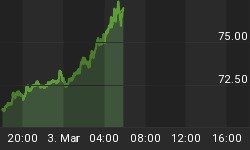Below is an excerpt from a commentary originally posted at www.speculative-investor.com on 26th September, 2010.
The Fed's official mandate is to promote maximum employment and price stability. Since changes in employment levels are effects of changes in the pace of economic growth, this effectively means that the Fed's official mandate is to promote maximum economic growth and price stability. Which naturally prompts the question: how could a committee with only interest-rate and money-supply manipulation tools fulfill such a mandate? Or, of more relevance to the current situation: how could bureaucrats help a weak economy to become strong when they are armed with only the ability to manipulate the price of credit and the money supply?
According to information presented in the mainstream media and the Fed's own press releases, the Fed can help strengthen a weak economy by providing "more accommodation"; in other words, by injecting more money into the economy and by pushing down on interest rates. But this just raises other questions, such as: how could pushing the interest rate below the market level and increasing the quantity of the medium of exchange possibly help generate real/sustained economic progress?
The answer, we're told, is that these actions would lead to more lending and more economic activity. But while it is probably correct to assert that there would be more lending and activity if interest rates were at lower levels and the supply of money were growing more rapidly, it is wrong to presume that such a turn of events would be beneficial. An increase in lending, for example, would only benefit the economy if it led to the funding of projects that made economic sense, but projects that make economic sense will usually get funded if interest rates are left alone. Therefore, there will be a tendency for any additional lending promoted by the Fed's suppression of interest rates to fund projects that do not make economic sense, resulting in the less-efficient use of resources. Injecting new money into the economy will also tend to result in the less-efficient use of resources. This is because it will distort relative prices (some prices rise earlier and faster than others in response to an increase in the money supply), leading to the misdirection of capital towards the parts of the economy that happen to experience the earliest and fastest price increases.
The point is that more lending and more activity is only beneficial if it is productive, but Fed "accommodation" will tend to result in non-productive lending and activity. This means that the more the Fed intervenes in the market in an effort to promote maximum economic growth, the weaker the economic structure will likely become.
The upshot is that per-capita economic growth and rising living standards can only be achieved via an increase in productivity, but when the Fed tries to help by making monetary conditions ultra 'easy' a likely result will be a reduction in the rate of productivity growth. Consequently, the last thing the US economy needs right now is a more accommodative Fed.
Let's now turn to price stability, the second component of the Fed's overall mandate. Whereas a basic knowledge of economic theory is needed to understand why the Fed can only reduce the economy's long-term growth potential through its monetary machinations, for an appreciation of the Fed's inability to promote "price stability" we need do nothing more complicated than take a glance at the historical record.
Exhibit A in the case against the Fed's ability to promote price stability is the 96% reduction in the US dollar's purchasing power since the 1913 establishment of the Fed. This compares rather unfavourably with the 0% reduction in the US dollar's purchasing power during the 100 years prior to the Fed's creation. Exhibit B is the following chart from our 26th November 2008 commentary, which points to increasing INSTABILITY in the financial markets since the creation of the Fed.

Chart Source: www sharelynx.com (with some notes and lines added by us)
So, it seems that in practice the Fed accomplishes the opposite of its official mandate. The US economy could therefore grow faster, with greater price stability, if the Fed were eliminated.
But even if the Fed's failure to accomplish its official mandate becomes increasingly obvious, the Fed won't be eliminated anytime soon. This is because the Fed's official mandate isn't its actual mandate. It is clear to us that the Fed's actual mandate is to promote relentless monetary inflation, thus facilitating the expansions of the government and the banking industry.
We aren't offering a free trial subscription at this time, but free samples of our work (excerpts from our regular commentaries) can be viewed at: http://www.speculative-investor.com/new/freesamples.html
















